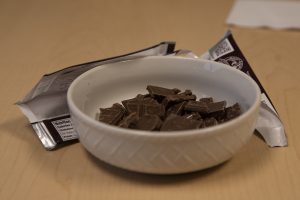Caffeine stunts students’ sleep schedules
According to doctors at the UI Sleep Disorders Clinic, caffeine is a greater threat to a student’s health than students commonly believe.
Photo illustration by Raquele Decker
September 10, 2019
Research shows that — much to busy students’ dismay — caffeine may not be a substitute for sleep.
According to the World Health Organization, caffeine is routinely recognized as an addictive substance. As students on campus continue to rely less on sleep and more on coffee, University of Iowa Sleep Disorders Clinic physician Eric Dyken said caffeine is also the single most common threat to a college student’s overall health.
Harvard Medical School research found that roughly 80 percent of adults take in some form of caffeine every day. The corresponding article explained that caffeine is a stimulant, meaning it excites function in the brain and central nervous system, and is often used to increase alertness and wakefulness.
“Good sleep hygiene helps with everything,” Dyken said. “Memory, health, everything. Good sleep is the most important thing you can do for your body.”
University of Michigan Health Services recently published information on its website that sleep issues are not the only effect of caffeine. The substance can also cause heartburn, depression, anxiety and nervousness, increased blood pressure, and tremors.
Dyken said caffeine is an adenosine receptor antagonist, preventing buildup of adenosine — a chemical that induces sleepiness — in one’s system.
While someone who has ingested caffeine may not feel sleepy, their body still needs rest just as much as it would without caffeine, Dyken said.
“Caffeine is not a substitute for sleep,” Dyken said. “You need sleep to keep you alive. We know when you don’t get enough sleep for a long enough time, you very literally die. There is something necessary about oxygen, about food, about water, and about sleep. You need all of them to survive.”
Two-thirds of otherwise healthy adults have trouble sleeping three to five nights each week, Dyken said. This can be a result of many factors such as stress or lack of exercise, he said, but it can also be a result of ingesting caffeine late at night.
Dyken explained that while caffeine can give students the necessary “boost” to get through a late-night task, once ingested, large amounts of caffeine can stay in effect up to six hours after its initial use.
“I drink at least two cups of coffee every single day,” T.Spoons Café barista Enisa Imsirovic said. “When I drink coffee, though, it makes it hard for me to get to sleep. I don’t fall asleep until very early, until at least one in the morning.”
Imsirovic said she drinks coffee as late as 6 p.m. to complete tasks such as homework, cleaning, cooking, and more. She admitted that when she doesn’t get enough sleep, however, she struggles to focus in class.
UI sophomore Emily Johnson agreed that caffeine dependence affects a wide community, particularly on college campuses such as the UI, and added that she drinks caffeinated tea daily.
“I know people who have [a] caffeine dependence,” Johnson said. “They have to have their coffee. They get migraines if they don’t get caffeine.”
Dyken said that the majority of adults need seven to nine hours of sleep each night, a need which is genetically ingrained in humans.
“If you think you can cheat mother nature, you can’t,” Dyken said. “You need sleep. You can use caffeine, but use it judiciously, because coffee is the single most common threat to a student’s overall health.”






